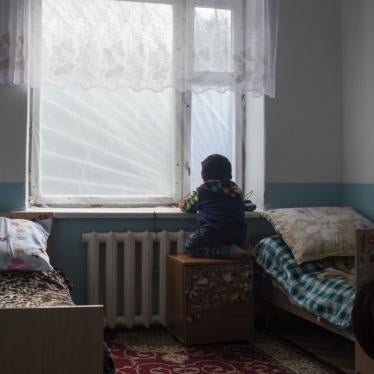(New York) – The International Paralympic Committee’s (IPC) president, Sir Philip Craven, should clarify his March 11 statement that the organization should focus only on sport in its selection of host cities for the Paralympic Games, Human Rights Watch said today.
The International Paralympic Committee’s president, Sir Philip Craven, made a public statement on March 11 that the IPC, in its selection of countries bidding to host the Olympics and Paralympics, should focus only on sport in its selection of host cities for the Paralympic Games. A large global coalition of rights groups has called for human rights reforms to the Olympic Charter and the Host City Contract process.
According to the Associated Press, Craven said, "There are so many things that could, maybe should be taken into account [regarding the selection of host cities] … I don't think we necessarily need to emphasize certain different areas, except one and that is sport – the athletes."
“Craven’s comments seem to totally ignore the IPC’s own principles,” said Andrea Mazzarino, American Council of Learned Societies public fellow and disability rights researcher at Human Rights Watch. “The IPC must require host cities to work toward an accessible environment. This is a human rights issue that the IPC itself has said should be factored into its selection of host cities.”
Russia is hosting the 2014 Winter Paralympic Games in Sochi, which will wrap up March 16. The IPC has highly praised Russia for its progress in creating a barrier-free environment in Sochi. However, people with disabilities arriving for the Paralympics last week found infrastructural barriers in Sochi, so that wheelchair users – athletes and visitors alike – were not able to navigate Sochi and the Olympic Park without assistance.
Human Rights Watch research and advocacy since 2007 has documented other serious human rights abuses linked to the 2014 Winter Games in Sochi. Abuses included forced evictions without proper compensation, exploitation of workers, including migrant workers, on Olympic sites, and pressure and harassment of activists and journalists who criticized the games’ preparations. Human Rights Watch documented similar abuses linked to preparations for the 2008 Summer Olympic and Paralympic Games in Beijing, China.
Human Rights Watch has said that while Russia has taken many steps towards removing various barriers for people with disabilities, such as by ratifying the Convention on the Rights of Persons with Disabilities, much more needs to be done to create a barrier-free environment.
The IPC handbook, which among other things lays out rules for the selection of host cities, states that “the host city already from the candidature phase needs to demonstrate a commitment to accessibility and inclusion.” It requires Olympic organizing committees and host cities to foster residents’ and visitors’ full enjoyment of the games, including by removing barriers in and beyond the host city.
“One of the IPC’s core commitments is to leave a positive legacy of inclusion and accessibility in the host country,” Mazzarino said. “This is why human rights issues are also crucial in the selection of a host city.”
The case of Russia is a strong example of why the IPC should emphasize human rights issues throughout the preparations for and during the Paralympic Games, Human Rights Watch said.
Human Rights Watch called on the IPC to speak out publicly about the shortcomings in Sochi, taking into account the perspectives of independent disability rights activists.
Craven’s March 11 statement is disappointing, given that in November 2013 he encouraged Russia to focus on leaving a lasting legacy of accessibility in Russia, stating that “The success of the games can be judged only by the legacy they leave.”
“The IPC should state clearly that it will consider candidate cities’ readiness to honor basic human rights and develop a barrier-free environment before they award the right to host the Paralympic Games,” said Mazzarino.






